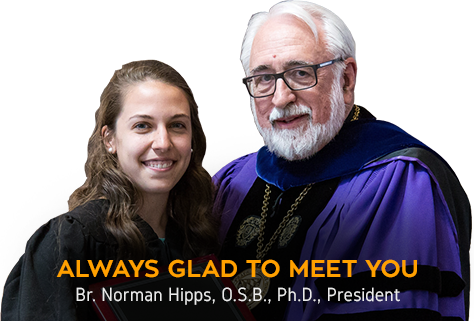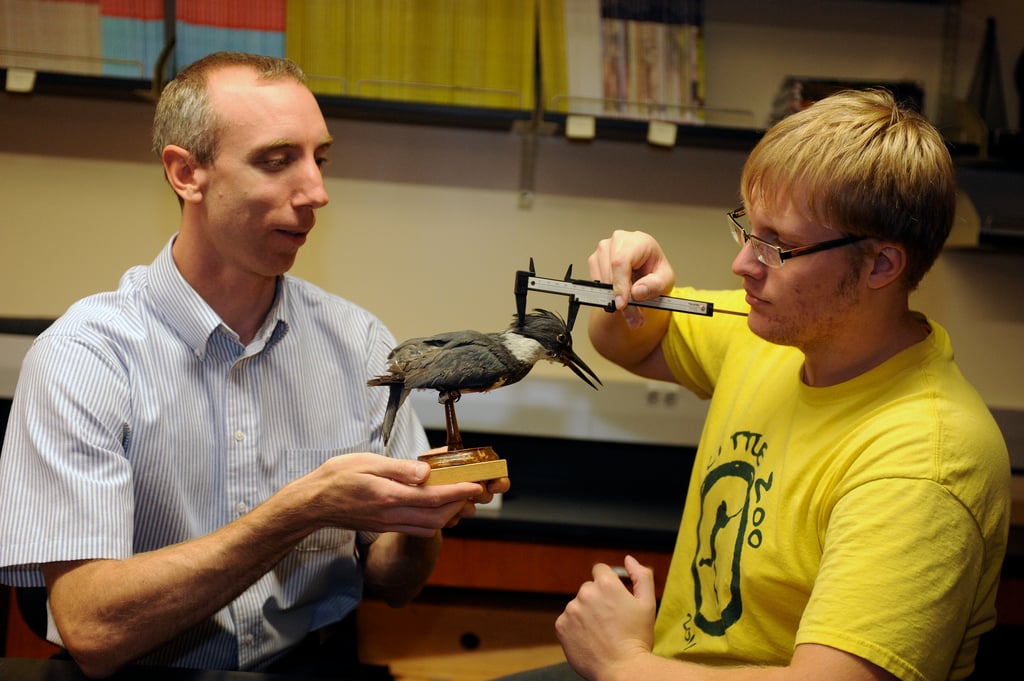I am trying to stay away from my normal work responsibilities while I am on sabbatical, but this is hard for two reasons: (1) I like what I do at work, and (2) there are some parts of my work that would be left undone if I was not there to do them. Both these reasons are true for the annual Bioethics Forum in the biology department.
There are 7 permanent, full-time faculty in the biology department at Saint Vincent. We all teach, supervise research projects, act as academic advisors, and, as I mentioned in a previous post, we all do community service. Faculty members also do “service to the department” and “service to the college.” I'll write about my college service later. This week, I agreed to serve my department despite being on sabbatical. Call me crazy.
My biology colleagues serve the department in different ways. One person meets with all students interested in doing off-campus internships and helps them submit the associated paperwork. One person meets with students interested in going to graduate school. Several faculty members serve on the pre-health committee, which shepherds students through the process of applying to medical school (or related programs). Many of us are involved in educational assessment, ensuring that our curriculum is meeting the needs of our students.
Anyway, I can’t list all the extra things we do for our department, but it is a lot. In my absence, I cannot expect any of my colleagues to take on the work that I do for the department because they are already doing their fair share.
One of the things I do in service to our department is run the annual Bioethics Forum.
Each year, I look for a speaker to present on how ethical decisions are involved in the science and practice of biology. Of course, the SVC biology faculty do discuss the ethical considerations of particular research techniques used in our courses. But these separate discussions in separate classrooms are not, by themselves, ideal. In contrast, the Bioethics Forum gives us the opportunity to discuss as a community—students and faculty alike—a topic with ethical implications that affects us all. We do so by first listening to the guest speaker's presentation in our lecture hall for 45 minutes. Then we break for dinner, and as we eat at separate tables, we discuss the presentation.

I usually place a list of questions or scenarios at each table for participants to ponder and talk about, just as a family might discuss matters when each person’s view is equally valuable to those of their tablemates. I then bring us to a close with a wrap-up discussion in which the guest speaker responds to the questions and points made by the participants at each table. The Bioethics Forum is distinctly different from the typical classroom experience, yet it is viewed by the biology faculty as part of the curriculum. I always love how it turns out.
This year’s presenter was Dr. Pilar Fish, DVM, director of veterinary medicine at the National Aviary.

The National Aviary is a zoo here in Pittsburgh dedicated to the care of more than 200 species of birds from around the world, many of them threatened or critically endangered in the wild. Dr. Fish is a world authority on the geriatric care of captive zoo animals, which has been improved via her numerous collaborations with human physicians.
Dr. Fish’s talk started out with an overview of the programs at the National Aviary. The organization certainly has a strong role in education (and entertainment, if you happen to enjoy birds). Like other zoos, it is also heavily involved in the conservation of rare species. When some of the birds at the National Aviary reproduce, the offspring are taken away and eventually reintroduced into the wild in order to augment wild populations.
There are a host of ethical issues that students discussed in relation to species conservation. From student-written notes that I collected from each table, I saw that one student was curious how often birds are released back into the wild, and about the overall success rate of re-introductions. Another student was interested in knowing what was being done at the Aviary to ensure reintroductions would be successful. A student discussed what could be done to protect penguins in South Africa. A student asked about the general causes for species endangerment. Another question was what the cost of these conservation programs was, and who pays for them. Is keeping animals captive really a good solution?
We didn’t have time for Dr. Fish to address all these questions, but that’s okay. When it comes to ethics, everyone has a different perspective and there is not necessarily a single “right” answer.
I have stopped writing now to look at that last sentence. It’s not really true. There are plenty of cases where the distinction between right and wrong is clear to most people. However, the best use of the Bioethics Forum might be to discuss topics in which there is less of a consensus on right and wrong.
Is it right to spend time and resources trying to save a penguin species from extinction? I think so, but I respect those who would disagree with me. Perhaps the importance of the Bioethics Forum is not to teach students why they should care about a certain topic, but rather to teach students to ask questions for which there are no answers, and to have their own views challenged and/or more developed by listening to others.

Anyways, the second part of Dr. Fish’s talk showed students the amazing creativity required to treat sick and injured birds at the National Aviary.
- She prevents lung infections using nebulizers initially developed for humans.
- She told us about several female birds who had trouble laying eggs and baby birds who had trouble hatching, and how she was able to facilitate these processes using tiny instruments used in human eye surgery.
- She showed pictures of wild birds recovering from leg fractures that had to be immobilized in slings hanging from trees as humans provided care. Some of the birds’ legs were too small for the usual repairs using metal hardware, so she developed alternative treatments using absorbable suture thread.
- She developed techniques that minimized pain and thus the need for anesthesia.
Students were enthralled by her stories. The ethical questions that arose from this part of her talk included how decisions were made to euthanize animals when they were too ill for further treatment. Students also discussed how one might manage animal stress during treatments; is the cure sometimes worse than the disease? Lastly, there is a financial cost to veterinary care. Where does the money come from, and is the spending justified?
I always use student questions to gauge the success of the night. Sometimes we invite speakers that don’t generate many student questions. In the students' defense, the presentations are always late in the day in a darkened lecture hall. But this week’s speaker clearly captured and held their interest. Dr. Fish's visit was completely successful.
I do have one little nagging concern.
All the questions and conversations I heard during the event were about things external to the students. But was there enough self-reflection? Were the students examining their own choices and opportunities to be ethical biologists? Did the students think about the research animals under their care, and about the animals we use in laboratory sessions? Did the students see how deeply loving Dr. Fish was for her animal patients, and did the students link that to the deep love that physicians should have for their human patients?
Students were not required to come to the Bioethics Forum and there were a lot of Biology majors missing. Which ones missed this presentation, yet really needed to hear it?


 中国学生
中国学生 Estudiantes
Estudiantes




